UnitSchoollife
牛津高中英语必修一Unit 1 School life 重点知识归纳 当堂训练 课后巩固(含答案)
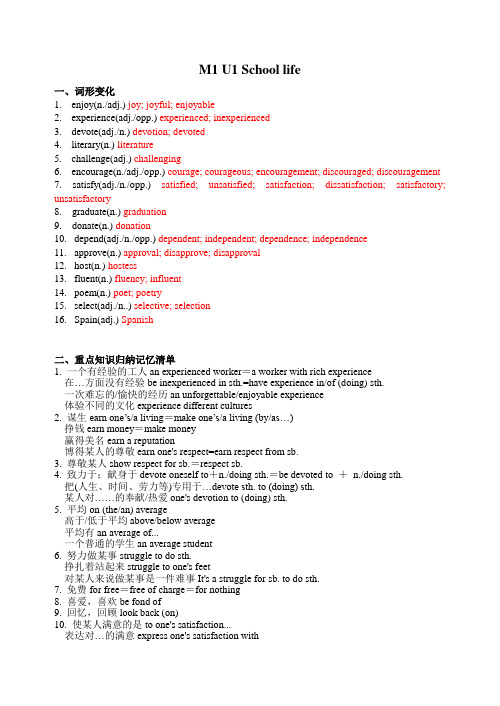
M1 U1 School life一、词形变化1.enjoy(n./adj.) joy; joyful; enjoyable2.experience(adj./opp.) experienced; inexperienced3.devote(adj./n.) devotion; devoted4.literary(n.) literature5.challenge(adj.) challenging6.encourage(n./adj./opp.) courage; courageous; encouragement; discouraged; discouragement7. satisfy(adj./n./opp.) satisfied; unsatisfied; satisfaction; dissatisfaction; satisfactory; unsatisfactory8. graduate(n.) graduation9. donate(n.) donation10. depend(adj./n./opp.) dependent; independent; dependence; independence11. approve(n.) approval; disapprove; disapproval12. host(n.) hostess13. fluent(n.) fluency; influent14. poem(n.) poet; poetry15. select(adj./n..) selective; selection16. Spain(adj.) Spanish二、重点知识归纳记忆清单1. 一个有经验的工人an experienced worker=a worker with rich experience在…方面没有经验be inexperienced in sth.=have experience in/of (doing) sth.一次难忘的/愉快的经历an unforgettable/enjoyable experience体验不同的文化experience different cultures2. 谋生earn one’s/a living=make one’s/a living (by/as…)挣钱earn money=make money赢得美名earn a reputation博得某人的尊敬earn one's respect=earn respect from sb.3. 尊敬某人show respect for sb.=respect sb.4. 致力于;献身于devote oneself to+n./doing sth.=be devoted to +n./doing sth.把(人生、时间、劳力等)专用于…devote sth. to (doing) sth.某人对……的奉献/热爱one's devotion to (doing) sth.5. 平均on (the/an) average高于/低于平均above/below average平均有an average of...一个普通的学生an average student6. 努力做某事struggle to do sth.挣扎着站起来struggle to one's feet对某人来说做某事是一件难事It's a struggle for sb. to do sth.7. 免费for free=free of charge=for nothing8. 喜爱,喜欢be fond of9. 回忆,回顾look back (on)10. 使某人满意的是to one's satisfaction...表达对…的满意express one's satisfaction with11. 和某人交换某物exchange sth. with sb.用A交换B exchange A for B以交换…in exchange for...12. 前者,后者the former,the latter 我以前的同事my former colleague13. 毕业于graduate from 毕业之后after graduation14. 把…捐给…donate...to...15. 谢谢你的好意thank you for your kindness16. 独立于某人be independent of sb. 依靠某人be dependent on sb.17. 利用make use of=take advantage of充分利用make full use of=make the best of=make the most of18. 明朝the Ming Dynasty19. 北京大学的王教授Professor Wang from Beijing University20. 告知某人某事inform sb. of/about sth.随时让某人了解某事keep sb. informed of sth.21. 开放时间opening hours22. 经营一家旅馆/自己的人生run a hotel/one's life23. 批准一项计划approve a plan=give approval to a plan同意某人做approve of sb. doing (不可用agree sb. to do)24. 现场直播be broadcast live 在电台里播放be broadcast on the radio25. 去远足go for an outing26. 一代代地传了下来be passed down generation after generation/from generation to generation为后代造福benefit future generations消除代沟narrow/bridge the generation gap27. 一个发达的国家a developed country 一个发展中的国家a developing country逐步养成…的习惯develop the habit of... 逐步对…感兴趣develop an interest in...冲洗照片develop photos患癌症develop cancer研制新的药物develop a new drug28. 文学作品literary works29. 参加集会attend an assembly30. 对…来说可得到的be available for…31. 错过做某事的机会miss the chance to do sth.32. 跳绳v. skip the rope n. the skipping rope33. 报名参加sign up for34. 发表演讲make/deliver a speech/an address35. 几件设备several pieces/items/articles of equipment当堂训练,探究问题一、根据首字母写出英语单词1.Simon worked an e xtra hour today so that he could finish the work earlier.2.8 hours is a fairly a verage working day for most people, but not for teachers.3.The best way to earn respect was to d evote/dedicate yourself to your work.4.He s elected a shirt to match his suit to attend the ceremony.5.We e xchanged ideas with each other on the hot issue.二、写出下列画线单词或词组的中文意思6.But legal experts are not sure if such a charge can stick.指控7.It is really a struggle to become used to academic life in Britain.学习生活8.He will make a speech about his splendid experiences.精彩的经历9.We should come up with some suggestions in terms of the problem.想出10.Just a minute. I will develop the film for you within five minutes.冲洗三、用括号里词的适当形式填空11.Jack felt disappointed when he failed to have the most challenging(challenge) job in thecompany.12.The students are as cool as a cucumber in the classroom, prepared(prepare) for theexamination.13.When she was 75 years old, Ding Ling, a modern Chinese writer, returned to literrary(literature) circles.14.Much to the manager’s dissatisfaction(satisfy), all the workers refused his demand.15.You should learn to be independent(dependent) of your parents upon beginning your collegeeducation.四、翻译句子16.一听到这个好消息,他们就高兴地跳了起来。
牛津译林版八年级上册Unit 2《School life》(Study skills)教学设计
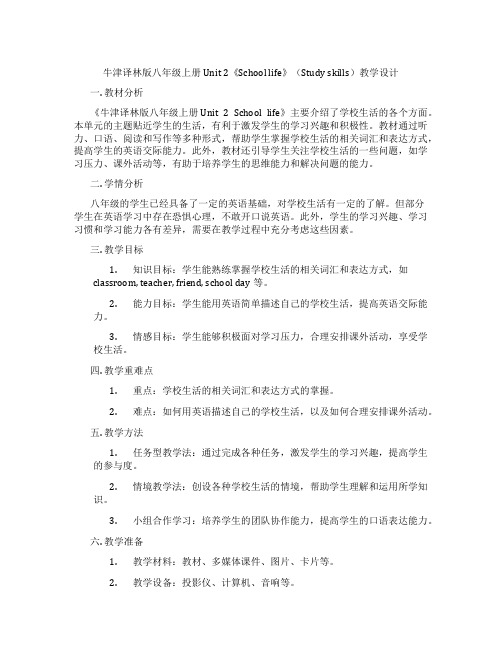
牛津译林版八年级上册Unit 2《School life》(Study skills)教学设计一. 教材分析《牛津译林版八年级上册Unit 2 School life》主要介绍了学校生活的各个方面。
本单元的主题贴近学生的生活,有利于激发学生的学习兴趣和积极性。
教材通过听力、口语、阅读和写作等多种形式,帮助学生掌握学校生活的相关词汇和表达方式,提高学生的英语交际能力。
此外,教材还引导学生关注学校生活的一些问题,如学习压力、课外活动等,有助于培养学生的思维能力和解决问题的能力。
二. 学情分析八年级的学生已经具备了一定的英语基础,对学校生活有一定的了解。
但部分学生在英语学习中存在恐惧心理,不敢开口说英语。
此外,学生的学习兴趣、学习习惯和学习能力各有差异,需要在教学过程中充分考虑这些因素。
三. 教学目标1.知识目标:学生能熟练掌握学校生活的相关词汇和表达方式,如classroom, teacher, friend, school day等。
2.能力目标:学生能用英语简单描述自己的学校生活,提高英语交际能力。
3.情感目标:学生能够积极面对学习压力,合理安排课外活动,享受学校生活。
四. 教学重难点1.重点:学校生活的相关词汇和表达方式的掌握。
2.难点:如何用英语描述自己的学校生活,以及如何合理安排课外活动。
五. 教学方法1.任务型教学法:通过完成各种任务,激发学生的学习兴趣,提高学生的参与度。
2.情境教学法:创设各种学校生活的情境,帮助学生理解和运用所学知识。
3.小组合作学习:培养学生的团队协作能力,提高学生的口语表达能力。
六. 教学准备1.教学材料:教材、多媒体课件、图片、卡片等。
2.教学设备:投影仪、计算机、音响等。
七. 教学过程1.导入(5分钟)利用图片或视频展示各种学校场景,引导学生谈论自己喜欢的学校生活。
教师提问:“What do you like about your school life?”,学生回答并介绍自己的学校生活。
UnitSchoollife练习题及答案
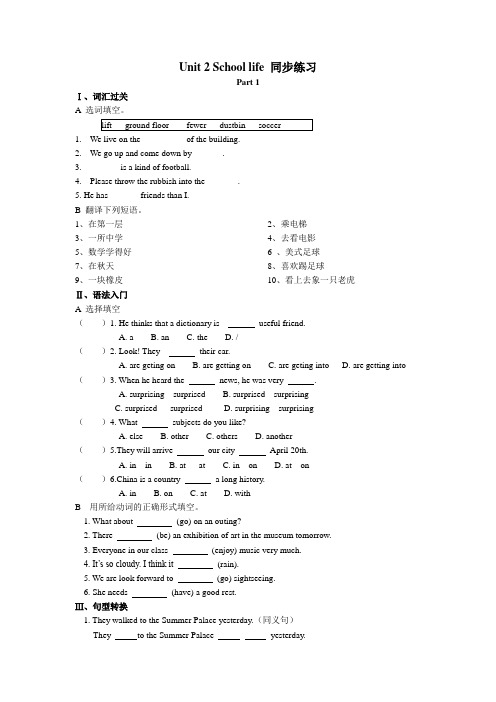
Unit 2 School life 同步练习Part 1Ⅰ、词汇过关A 选词填空。
1.We live on the __________of the building.2.We go up and come down by_______.3._______is a kind of football.4.Please throw the rubbish into the _______.5. He has _______friends than I.B 翻译下列短语。
1、在第一层2、乘电梯3、一所中学4、去看电影5、数学学得好 6 、美式足球7、在秋天8、喜欢踢足球9、一块橡皮10、看上去象一只老虎Ⅱ、语法入门A 选择填空()1. He thinks that a dictionary is useful friend.A. aB. anC. theD. /()2. Look! They their car.A. are geting onB. are getting onC. are geting intoD. are getting into ()3. When he heard the news, he was very .A. surprising surprisedB. surprised surprisingC. surprised surprisedD. surprising surprising()4. What subjects do you like?A. elseB. otherC. othersD. another()5.They will arrive our city April 20th.A. in inB. at atC. in onD. at on()6.China is a country a long history.A. inB. onC. atD. withB 用所给动词的正确形式填空。
unit2《schoollife》知识讲解(牛津英语初二上)doc初中英语

unit2《schoollife》知识讲解(牛津英语初二上)doc初中英语学习内容一、Language points 重点难点讲二、综合技能和发音课文讲解一、Language points 重点难点讲1.Daniel wants to learn more about the subjects that British students study.丹尼尔想了解更多有关英国学生所学的课程的情形。
句中的study为及物动词,它的宾语是引导定语从句的关系代词that.▲study作及物动词或不及物动词,意为〝学习〞〝研究〞。
如:①All of then study hard.他们大伙儿都努力学习。
②They are studying the beginning of life.他们正研究生命的起源。
▲study 也可作名词,意为〝研究〞〝学习〞〝书房〞。
如:①They are making a study of UFO.他们正在对不明飞行物进行研究。
②How are you getting on with your studies ?你的学习情形如何?▲learn 作〝学习〞解时,一样指学习、学会较简单的东西,后接动词不定式作宾语。
作〝明白〞解时,可接从句作宾语。
Learn of /about 意为〝了解〞〝听讲〞。
如:①They are learning some new words. 他们在学一些新单词。
②We are learning to drive/how to drive. 我们在学开车。
听到他逝世的消息我们专门难过。
[注]在表示〝学习科目〞的两词可换用。
如:①He learns /studies English. 他学英语。
2.John wrote back and attached some pictures to his e-mail.约翰回复了并把一些照片粘贴到了电子邮件上。
attach 作及物或不及物动词,意为〝附上〞〝加上〞〝贴上〞,常与介词to连用。
Unit 1 School life 重点词汇拓展(课件)六年级英语上册(牛津上海版2024)

same /seɪm/ adj.一样的
【提示】same 通常要和定冠词the一起使用。如: The two girls look the same. They are twins. 这两个女孩看着一模一样,她们是双胞胎。 常用the same as 的结构表示“和……一样”的意思。如: My watch is the same as yours. 我的手表和你的一模一样。 【反义】different /'dɪfrənt/ adj.不同的;有区别的 at the same time意为“同时”,表示两个或多个事件或情况同时发生 或存在。 如: She looks so beautiful,but at the same time very proud. 她看着如此漂 亮, 但与此同时她又是那么高傲。
பைடு நூலகம்
表示“生活 He worries a lot about his everyday 经历”时不 life.他为自己的日常生活操碎了心。 可数
表示“人命 The fire took thirty-nine lives.这场火
”“一 生” 灾夺去了39条人命。
时可数
Everyone wants a long life.人人都希望能
ICT/,aɪ si:' ti:/n.(=information and communications technology)信息通 信技术(课程)
geography /dʒi'ɒgrəfi/ n.地理 Sally is now doing her geography homework.萨利正在做 地理作业。(表示一门学科) Mr Tang is an expert in the geography of America.唐先生 是研究美洲地理的专家。(表示地形、地貌等地理特征)
牛津译林版英语八上Unit 2《School life》(welcome)教学设计

牛津译林版英语八上Unit 2《School life》(welcome)教学设计一. 教材分析牛津译林版英语八上Unit 2《School life》主要介绍了学校生活的相关话题,包括课堂活动、课外活动和学校设施等。
本单元通过不同场景的描述,让学生了解并掌握与学校生活相关的词汇和表达方式,同时培养他们的听说读写技能。
二. 学情分析学生在进入八年级时已经具备一定的英语基础,能够进行简单的听、说、读、写操作。
但部分学生对学校生活的相关词汇和表达方式还不够熟悉,因此需要在教学过程中加强对这些学生的关注,帮助他们更好地掌握本单元内容。
三. 教学目标1.知识目标:学生能够掌握本单元的生词和短语,了解学校生活的相关场景和表达方式。
2.技能目标:学生能够熟练运用本单元的词汇和表达方式进行日常交流,提高听说读写能力。
3.情感目标:通过学习本单元,学生能够更加热爱学校生活,积极参与各种课外活动。
四. 教学重难点1.重点:本单元的生词和短语,以及与学校生活相关的表达方式。
2.难点:如何运用本单元的词汇和表达方式进行日常交流,特别是在不同场景下的运用。
五. 教学方法1.任务型教学法:通过设计各种任务,让学生在实际操作中运用所学知识。
2.情境教学法:创设各种学校生活的情境,让学生在真实的环境中学习。
3.小组合作学习:鼓励学生分组讨论,培养团队合作精神。
六. 教学准备1.教材:牛津译林版英语八上Unit 2《School life》2.多媒体设备:用于展示图片、视频等教学资源3.教学卡片:用于呈现生词和短语4.练习册:用于巩固所学知识七. 教学过程1.导入(5分钟)利用多媒体展示一些学校生活的图片,如教室、操场、图书馆等,引导学生谈论他们所熟悉的学校生活。
2.呈现(10分钟)老师呈现本节课的生词和短语,如classroom, teacher, library等,并用简单的句子介绍它们的意思。
同时,让学生跟读,确保他们正确发音。
1 Unit 1 School life 课件(共53张PPT)
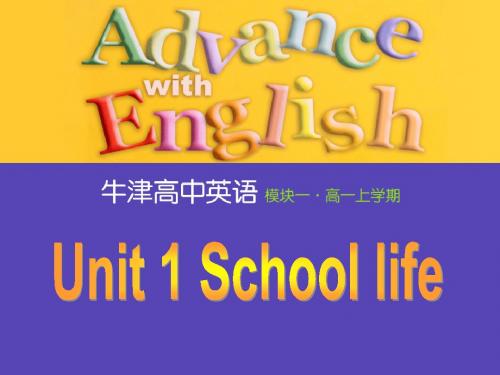
(二) 派生单词
13. enjoyable adj. 有乐趣的;令人愉快的 → enjoy v.喜欢;享受 14. respect n.&vt. 尊敬,尊重 → respectful adj. 恭敬的, 尊重人的 15. challenging adj. 具有挑战性的 → challenge n.&v. 挑战 16. devote vt. 致力于;献身 → devoted adj. 忠实的;深爱的 → devotion n. 奉献;挚爱
17. donate vt. 捐赠 → donation n.捐赠,捐款 → donator n.捐赠者 18. graduation n.毕业 → graduate v.毕业 → graduate n.(大学)毕业生 19. approve vt.&vi. 批准,通过;赞成,同意 → approval n.批准,赞成 20. preparation n.准备,筹备 →prepare v.把……准备好,筹备 → prepared adj. 有准备的
【运用】 ①He is in charge of the project because he is rich in experience. 由于他富有经验,所以他负责这项工程。 →The project is in the charge of him because he is rich in experience. Tip in charge of “负责,掌管”,主语通常为 人,含主动意义。in the charge of “由……主管”,主语通常为物,含被动 意义。
⑷ in respect of (=with respect to) 关于;至于 ⑸ give/send one’s respects to sb. 代某人问 候 某人 ⑹ respect sb. for ... 因……而尊重某人
高中英语作业必修一:Unit《Schoollife》四含答案译林版

8.He ________(应得)this prize.
9.You should learn to ________(辩护)yourself.
10.She was ashamed of her child's bad ________(行为).
B
A couple from Miami, Bill and Simone Butler, spent sixty six days in a life raft(救生艇) in the seas of Central America after their boat sank.
Twenty one days after they left Panama in their boat, Simony, they met some whales(鲸鱼).“They started to hit the side of the boat,”said Bill, “and then suddenly we heard water.” Two minutes later, the boat was sinking. They jumped into the life raft and watched the boat go under the water.
1.Lao Yang wrote a lot of stories because________.
A.he likes reading
B.he learned much at school
C.he wanted to be a writer
D.he wanted to help others
牛津译林版Unit《Schoollife》Reading课件

06
教学反思与总结
教学效果反思
学生参与度
学生是否积极参与课堂讨论和 活动,是否能够集中注意力。
目标达成率
是否能够达到课程目标,以及学 生对所学内容的掌握程度。
课堂氛围
是否能够营造积极、轻松的课堂氛 围,让学生更加愉悦地学习。
教学方法总结
任务型教学
通过设计任务和问题,引导学 生自主探究和思考,培养其自
过程与方法
通过阅读、听力、口语和写作等 多种方式,培养学生的语言综合 运用能力和自主学习能力。
情感态度价值观
通过学习,使学生更加了解和适 应学校生活,增强学生的自信心 和团队合作意识。
教学要求
掌握常用词汇和短语,并能够初步运用这些词汇 和短语进行简单的对话和描述学校生活。
能够初步理解和运用相关语法知识进行简单的写 作。
2023
牛津译林版unit《 schoollife》reading课件
contents
目录
• 教学目标和要求 • 教学内容解析 • 教学方法与技巧 • 教学环节设计 • 教学过程详细阐述 • 教学反思与总结
01
教学目标和要求
教学目标
知识与技能
使学生掌握常用的词汇和短语, 如“uniform”, “headteacher”, “classmate”等,并能够初步 理解和运用这些词汇和短语进行 简单的对话和描述学校生活。
文中的知识点。
总结归纳
03
将知识点进行归纳总结,形成知识体系,方便学生记忆和理解
。
教学辅助手段
多媒体教学
使用多媒体课件,将文本、图片、音频、视频等 多种信息形式结合起来,提高教学效果。
网络教学
利用网络平台,实现远程教学、在线答疑等功能 ,增强与学生的互动交流。
高中英语作业必修一:Unit《Schoollife》二含答案译林版
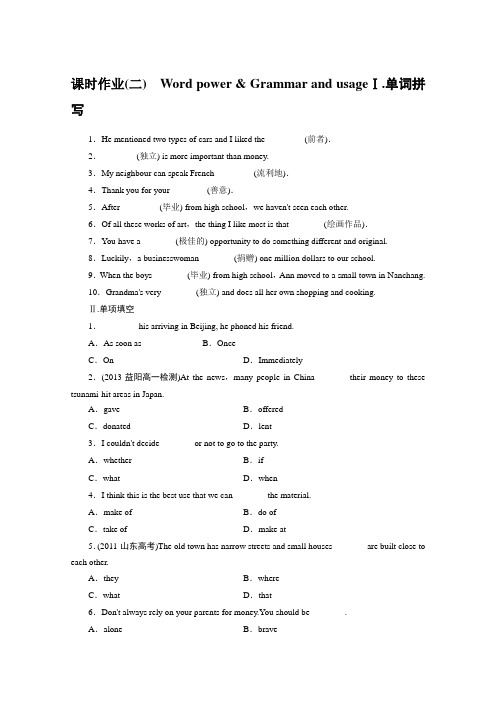
课时作业(二)Word power & Grammar and usageⅠ.单词拼写1.He mentioned two types of cars and I liked the ________ (前者).2.________(独立) is more important than money.3.My neighbour can speak French ________ (流利地).4.Thank you for your ________(善意).5.After ________ (毕业) from high school,we haven't seen each other.6.Of all these works of art,the thing I like most is that________(绘画作品).7.You have a________(极佳的) opportunity to do something different and original.8.Luckily,a businesswoman________(捐赠) one million dollars to our school.9.When the boys________(毕业) from high school,Ann moved to a small town in Nanchang.10.Grandma's very________(独立) and does all her own shopping and cooking.Ⅱ.单项填空1.________ his arriving in Beijing, he phoned his friend.A.As soon as B.OnceC.On D.Immediately2.(2013·益阳高一检测)At the news,many people in China________their money to these tsunami-hit areas in Japan.A.gave B.offeredC.donated D.lent3.I couldn't decide________or not to go to the party.A.whether B.ifC.what D.when4.I think this is the best use that we can________the material.A.make of B.do ofC.take of D.make at5.(2011·山东高考)The old town has narrow streets and small houses________are built close to each other.A.they B.whereC.what D.that6.Don't always rely on your parents for money.You should be________.A.alone B.braveC.easygoing D.independent7.He graduated ________ Cambridge University. That is to say, he is a graduate ________ a famous university.A.from; of B.of; ofC.of; from D.from; on8.He mentioned two hotels just now. The ________is a four-star one, and the latter is even better.A.first B.laterC.one D.former9.A person ________e-mail account is full won't be able to send or receive any e-mails.A.who B.whomC.whose D.whoever10.Is that the exhibition________the second-year students visited last Sunday?A.where B.whichC.in which D.the one11.I still remember the people and things ________you talked about.A.who B.whichC.that D.whose12.(2013·扬州高一检测)I know many children in the school________eyesight is weak.A.who B.whomC.that D.whose13.This is the only choice________I can make now.A.which B.thatC.what D.the one14.You can take any seat ________ is free.A.which B.whereC.in which D.that15.This is the very chance ________ I'm looking forward to.A.to which B.whichC.whose D.thatⅢ.完形填空Dear Ralph,I'm a girl in senior middle school Grade Two. In junior middle school I did very well in my studies. But when I entered senior middle school I began to__1__ the bitterness (苦涩) of failing.A girl who was not as good as me in __2__ middle school surpassed (超过) me. My mother often scolded (责怪)me. I can't __3__her, so when I return home I don't want to talk to her.When I do a good job, she __4__ says,“Don't be so __5__. Think of ×××,she did better than you.”When I do __6__ bad, she says, “What are you doing?Think of ×××,she is always better than you. ”I had a (an) __7__ talk with her. But she just said __8__,“When you grow up, you will know that I did good for you.” Am I proud? __9__. I just want to give myself confidence.I can't __10__ with her. I don't want to go with her. What should I do?Cinderella(灰姑娘)Cinderella,First analyze(分析) by yourself __11__ you have fallen behind. Is there something wrong with you,__12__ is the girl who surpassed you an outstanding person who is always at the __13__ ? And does it matter? Can you be number two and __14__ do well in exams and get into a good university?To communicate, ask your __15__ about her own life. Did someone __16__ her? If she regrets any experiences, she may hope you will realize her own __17__. This wish is common among __18__.However, don't blame that she should __19__ success. If she scolds but cannot help, she clearly knows study is important but does not know how to study __20__.Do what you think is best.Ralph1.A.meet B.tasteC.understand D.see2.A.junior B.highC.senior D.super3.A.trust B.realizeC.stand D.believe4.A.often B.seldomC.usually D.only5.A.satisfied B.happyC.proud D.excited6.A.something B.anythingC.everything D.nothing7.A.face-to-face B.open-heartedC.heated D.lonely8.A.warmly B.nervouslyC.carelessly D.coldly9.A.Never B.YesC.Hardly D.Almost10.A.talk B.communicateC.live D.sit11.A.why B.whenC.whether D.where12.A.but B.orC.and D.yet13.A.head B.topC.ceiling D.front14.A.ever B.stillC.either D.even15.A.classmate B.fellowC.teacher D.mother16.A.surpass B.followC.pass D.defeat17.A.experience B.failureC.dream D.regret18.A.students B.peopleC.teachers D.parents19.A.hope B.seekC.win D.get20.A.fast B.busilyC.effectively D.hardⅣ.阅读理解Are you scared about moving up to senior high school? It can be a new experience, but you shouldn't worry. We've put together a guide on how to survive the first week.You're not aloneRemember everybody_else_in_your_year_is_in_the_same_boat. They may not realize it, but they're just as nervous as you are. Moving to senior high is an opportunity, not a problem. Things are different and all you need to do is be polite and learn the new rules.Teachers are ready to help!If you're unsure what to do or are worried about anything then you had better ask for help. Teachers are probably the best people to turn to as they're experienced in helping new students. Some senior high s chools also have a “friends system”. If your school has this, then you will bepaired with an older student. They will look out for you and help you if you have any problems or questions.All changeThere are lots of differences between junior high school and senior high school. You'll have a homework diary or a student planner. You will have your lessons with different teachers in different rooms. You will have homework for different subjects on different days, so make sure you get organized. Make sure you have a copy of your school timetable written down so you know which rooms your classes are in and on which days you will have your different subjects.Other pointsIf you've got an older brother or sister at the school then ask them for advice.Be yourself! It sounds simple, but people will know you much better if you just act naturally.Having early nights makes a difference and you'll find it easier to get up in the morning!1.Which of the following is closest in meaning to the underlined sentence?A.Other students have similar feelings to yours.B.Other students have to learn boating with you.C.Other students will help you solve your problems.D.Other students will teach you politeness and new rules.2.The new students turn to teachers first when having problems because________.A.teachers won't blame them as parents doB.teachers are good at helping solve problemsC.teachers are equal to every studentD.parents are too busy to help them3.How many of the followings are the author's advice for a new senior high school student?①keeping a homework diary②making a plan③keeping a copy of school timetable④getting yourself organized⑤going to classrooms half an hour before the classesA.2B.3C.4D.54.Which of the following is NOT true?A.You can act in a natural way.B.You should go to bed early enough.C.You must focus on dressing properly.D.You may ask your older brother for advice.5.What's the purpose of the passage?A.To tell students the importance of learning.B.To warn students not to ignore friendship in senior high.C.To make a difference when moving up to senior high. D.To help new students to get used to life in senior high.课时作业(二)Ⅰ.1.former 2.Independence 3.fluently 4.kindness 5.graduating 6.painting7.splendid 8.donated9.graduated10.independentⅡ.1.C句意:他一到达北京就给他朋友打了电话。
Unit 1 《School life》教案4(牛津版必修模块1)
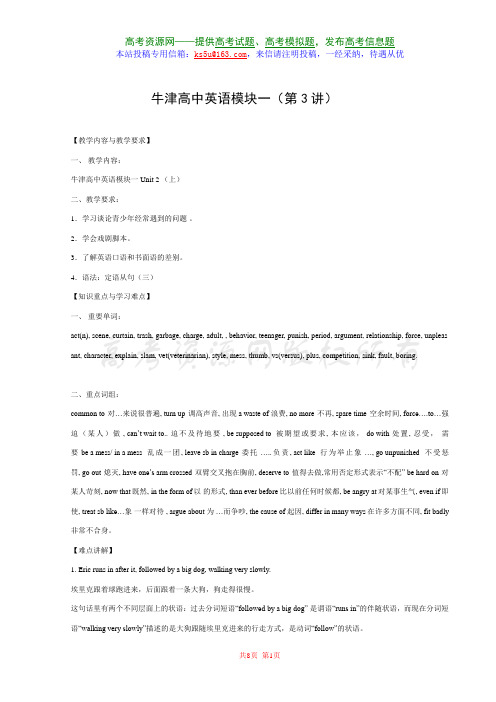
牛津高中英语模块一(第3讲)【教学内容与教学要求】一、教学内容:牛津高中英语模块一Unit 2 (上)二、教学要求:1.学习谈论青少年经常遇到的问题。
2.学会戏剧脚本。
3.了解英语口语和书面语的差别。
4.语法:定语从句(三)【知识重点与学习难点】一、重要单词:act(n), scene, curtain, trash, garbage, charge, adult, , behavior, teenager, punish, period, argument, relationship, force, unpleas ant, character, explain, slam, vet(veterinarian), style, mess, thumb, vs(versus), plus, competition, sink, fault, boring.二、重点词组:common to对…来说很普遍, turn up调高声音, 出现 a waste of 浪费, no more不再, spare time空余时间, for ce….to…强迫(某人)做 , can’t wait to.. 迫不及待地要 , be supposed to被期望或要求, 本应该, do with 处置, 忍受,需要 be a mess/ in a mess乱成一团, leave sb in charge 委托…..负责, act like行为举止象…, go unpunished不受惩罚, go out熄灭, have one’s arm crossed双臂交叉抱在胸前, deserve to值得去做,常用否定形式表示“不配” be hard on对某人苛刻, now that既然, in the form of以的形式, than ever before比以前任何时候都, be angry at对某事生气, even if即使, treat sb like…象一样对待 , argue about为…而争吵, the cause of起因, differ in many ways在许多方面不同, fit badly 非常不合身。
牛津译林版Unit《Schoollife》Grammar课件
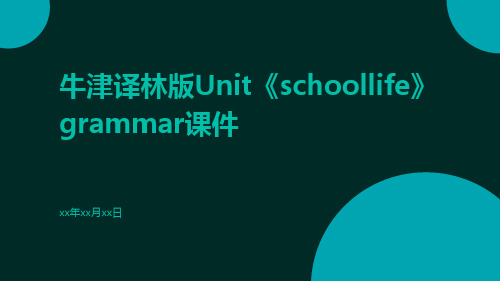
使用方法
教师可结合课堂教学和课 后练习两种方式使用本课 件。
课件整体结构
1 2
课件内容
课件主要包括学校生活相关的英语语法知识点 ,包括名词、动词、形容词、副词等。
结构特点
课件结构清晰,每个语法知识点都有详细的解 释和例句,并配有练习题和答案。
3
课件模块
课件分为多个模块,每个模块包括学习目标、 知识讲解、例句分析、练习题等。
通过小组活动,引导学生进行讨论、交流和 合作,提高语法知识的运用能力。
Pair work搭档合作
个人展示
通过搭档合作,进行对话、交流和练习,帮 助学生巩固和深化语法知识。
通过个人展示,鼓励学生展示自己的学习成 果和表达能力,同时也可以帮助教师了解学 生的学习情况。
04
教学评价与反思
教学评价
01 02
02
课件内容及教学流程
课件内容
• 课件总览:本课件共分为六个部分,包括学校设施、学校生活、课程学习、考试评价、课外活动和总结提 升,涵盖了学校生活的各个方面。
• 学校设施:介绍学校内各种设施的名称、位置和使用方法,包括图书馆、实验室、食堂等。 • 学校生活:介绍学校日常生活的各个环节,包括上课时间、课间休息、午餐时间和放学后活动等。 • 课程学习:介绍各学科的名称和主要学习内容,以及学科用具的使用方法。 • 考试评价:介绍考试和评价的内容、方法和标准,以及如何正确面对考试和评价。 • 课外活动:介绍各种课外活动的名称和内容,包括社团活动、文艺比赛、运动会等。 • 总结提升:对本单元的学习内容进行总结,并提醒学生注意自身素质的提升。
05
教学资源与链接
教学资源
课本教材
牛津译林版教材是按照《英语课程标准》编写的,课件 制作需结合课本内容,突出重点和难点。
Unit2Schoollife教学设计2024-2025学年牛津译林版英语八年级上册

在行为习惯方面,学生们具备较好的学习习惯和纪律性,能够按时完成作业和参加课堂活动。然而,部分学生可能存在对英语学习兴趣不高、积极性不足等问题。针对这一情况,我将采用多种教学手段和策略,激发学生的学习兴趣,提高他们的学习积极性。
- 反馈作业情况:及时批改作业,给予学生反馈和指导。
学生活动:
- 完成作业:认真完成老师布置的课后作业,巩固学习效果。
- 拓展学习:利用老师提供的拓展资源,进行进一步的学习和思考。
- 反思总结:对自己的学习过程和成果进行反思和总结,提出改进建议。
教学方法/手段/资源:
- 自主学习法:引导学生自主完成作业和拓展学习。
Unit2Schoollife教学设计2024-2025学年牛津译林版英语八年级上册
主备人
备课成员
教材分析
《Unit2 Schoollife》教学设计 2024-2025学年牛津译林版英语八年级上册
本节课内容主要围绕学校生活展开,通过描述不同学科的老师和学生们的日常生活,让学生们能够掌握相关词汇和表达方式,提高他们的听说读写能力。同时,通过本节课的学习,学生们能够更好地了解学校生活,增强他们对学习的热情和兴趣。
3. 思维品质:通过各种互动活动,如小组讨论、角色扮演等,学生能够培养他们的批判性思维和创新思维,提高他们解决问题的能力。
4. 学习能力:通过自主学习、合作学习和探究学习,学生能够培养他们的自主学习能力、合作学习能力和探究学习能力,提高他们的学习效率。
学情分析
本节课的对象是八年级的学生,他们已经掌握了基本的英语语法和词汇,具备一定的听、说、读、写能力。在学习本节课的内容时,他们能够运用已学的知识进行简单的交流和表达。然而,他量和提高语言运用能力。
Unit1SchoolLife词转梳理2024-2025学年英语六年级上册
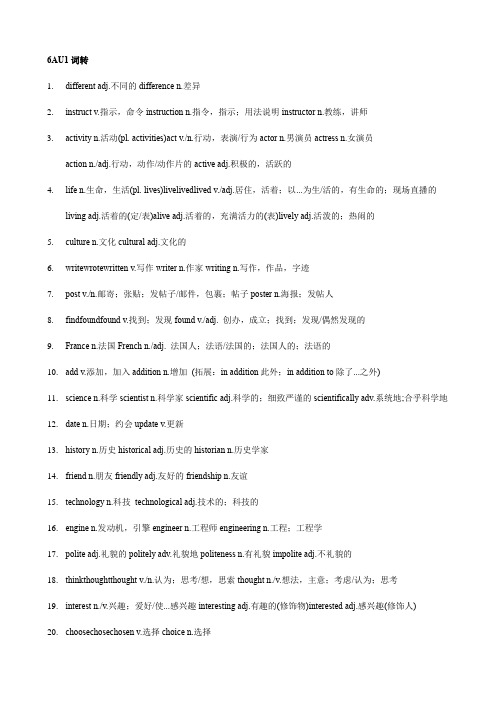
6AU1词转1.different adj.不同的difference n.差异2.instruct v.指示,命令instruction n.指令,指示;用法说明instructor n.教练,讲师3.activity n.活动(pl. activities)act v./n.行动,表演/行为actor n.男演员actress n.女演员action n./adj.行动,动作/动作片的active adj.积极的,活跃的4.life n.生命,生活(pl. lives)livelivedlived v./adj.居住,活着;以...为生/活的,有生命的;现场直播的living adj.活着的(定/表)alive adj.活着的,充满活力的(表)lively adj.活泼的;热闹的5.culture n.文化cultural adj.文化的6.writewrotewritten v.写作writer n.作家writing n.写作,作品,字迹7.post v./n.邮寄;张贴;发帖子/邮件,包裹;帖子poster n.海报;发帖人8.findfoundfound v.找到;发现found v./adj. 创办,成立;找到;发现/偶然发现的9.France n.法国French n./adj. 法国人;法语/法国的;法国人的;法语的10.add v.添加,加入addition n.增加(拓展:in addition此外;in addition to除了...之外)11.science n.科学scientist n.科学家scientific adj.科学的;细致严谨的scientifically adv.系统地;合乎科学地12.date n.日期;约会update v.更新13.history n.历史historical adj.历史的historian n.历史学家14.friend n.朋友friendly adj.友好的friendship n.友谊15.technology n.科技technological adj.技术的;科技的16.engine n.发动机,引擎engineer n.工程师engineering n.工程;工程学17.polite adj.礼貌的politely adv.礼貌地politeness n.有礼貌impolite adj.不礼貌的18.thinkthoughtthought v./n.认为;思考/想,思索thought n./v.想法,主意;考虑/认为;思考19.interest n./v.兴趣;爱好/使...感兴趣interesting adj.有趣的(修饰物)interested adj.感兴趣(修饰人)20.choosechosechosen v.选择choice n.选择21.own v./adj./pron.有,拥有/自己的/属于自己的owner n.所有者,物主22.art n.艺术artist n.艺术家article n.文章23.connect v.连接connection n.连接,联系24.person n.人,个人personal adj.个人的,私人的personally adv.亲自地,本人地;就个人而言personality n.个性;性格e v./n.使用useful adj.有用的useless adj.无用的username n.用户名26.general adj./n.总体的;普遍的;一般的/上将,将军generally adv.通常;普遍地27.plete adj./v.完全的,完整的/完成pletely adv.完全地28.detail n./v.细节;详情/详细说明detailed adj.详细的29.far adj.远的further adj./adv.进一步的;更远的;此外,而且30.mean v./adj./n.意味着;打算/吝啬的/平均数means n.方法;手段meaning n.意思,含义,意义meaningful adj.有意义的,重要的meaningless adj.无意义的meaningfully adj.有意义地31.similar adj.相似的similarly adv.相似地similarity n.相似性32.reason n./v.原因,理由/推断出reasonable adj.合情理的,有道理的33.simple adj.简单的;朴素的simply adv.仅仅;简单地simplify v.使简化34.agree v.同意;达成一致意见agreement n.协议;同意disagree v.不同意;有分歧35.true adj.真实的;准确的truly adv.真实地36.correct adj./v.正确的/改正uncorrected adj.未修正的incorrect adj.错误的,不正确的correctly adv.恰当地;正确地37.safe adj./n.安全的/保险箱safely adv.安全地safety n.安全save v.救助/节省38.discover v.发现;找到discovery n.发现;探索39.practice n./v.实践;练习practise v.练习40.serve v.服务service n.服务servant n.仆人41.taste v./n.品尝/味道;品味tasty adj.美味的42.beginbeganbegun v.开始beginning n.开始43.relax v.放松relaxed adj.感到放松的relaxing adj.令人放松的relaxation n.放松44.introduce v.介绍introduction n.介绍。
2024新沪外教版初一上英语Unit 1 School life单词表
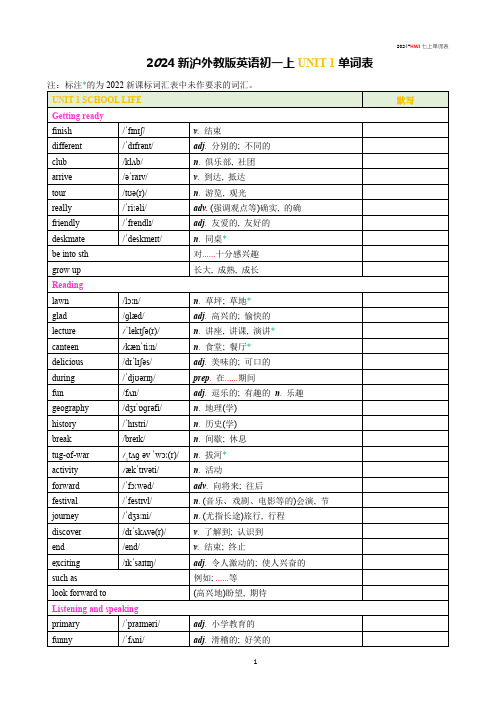
注:标注*的为 2022 新课标词汇表中未作要求的词汇。
UNIT 1 SCHOOL LIFE
Getting ready
finish
/ˈfɪnɪʃ/
v. 结束
different
/ˈdɪfrənt/
adj. 分别的; 不同的
club
/klʌb/
n. 俱乐部, 社团
/ˈfʌni/
adj. 滑稽的; 好笑的
1
2024-HWJ 七上单词表
默写
patient energetic smile explain fit style lucky role model enjoyable bring out role model
/ˈpeɪʃənt/ /ˌenəˈdʒetɪk/ /smaɪl/ /ɪksˈpleɪn/ /fɪt/ /staɪl/ /ˈlʌki/ /rəʊl/ /ˈmɒdl/ /ɪnˈdʒɔɪəbl/
activity
/ækˈtɪvəti/
n. 活动
forward
/ˈfɔːwəd/
adv. 向将来; 往后
festival
/ˈfestɪvl/
n. (音乐、戏剧、电影等的)会演, 节
journey
/ˈdʒɜːni/
n. (尤指长途)旅行, 行程
discover
/dɪˈskʌvə(r)/
v. 了解到; 认识到
grow up
长大, 成熟, 成长
Reading
lawn
/lɔːn/
n. 草坪; 草地*
glad
/ɡlæd/
adj. 高兴的; 愉快的
lecture
/ˈlektʃə(r)/
- 1、下载文档前请自行甄别文档内容的完整性,平台不提供额外的编辑、内容补充、找答案等附加服务。
- 2、"仅部分预览"的文档,不可在线预览部分如存在完整性等问题,可反馈申请退款(可完整预览的文档不适用该条件!)。
- 3、如文档侵犯您的权益,请联系客服反馈,我们会尽快为您处理(人工客服工作时间:9:00-18:30)。
Unit5 School life一、Grammar and Gap FillerA. Grammar1) I always/often…2) I like doing…/to do…3) I enjoy doing... 4) I prefer doing…5) I am going to…6) I did…7) Comparative and superlative of adjective 形容词比较级和最高级B. Gap Filler表示正在思考:Let me see. How to say It is not easy to say It is hard to say 表示陈述事实:You know to be honest to be frank to tell you the truthin fact表示要表达自己的看法:In my opinion I think表示解释自己的句子:What I mean is that is to say what I want to say is)E. Adverb (副词的比较级和最高级1 / 111)定义. 表示方式的副词,用来修饰动词和形容词的词,表示怎么做某事。
副词大部分通过形容变化而来。
2)位置. 副词一般放在动词,形容词后3)副词的构成.A. 一般情况下,在形容词后加-ly即可,e.g. quick-quickly The dog eats his dinner quickly。
slow-slowly Please drive slowly near the school.B. 若形容词以y结尾,变副词时,把y改成i 再加上ly, 即是以-ily结尾.e.g. happy-happily The children played happily in garden.easy-easily I did that homework easily.C. 特殊变化或者和形容词同形.e.g. good-well She speak English well.fast-fast The lion can run very fast.hard-hard We must study harder4)副词的比较级和最高级.副词和形容词一样有比较级和最高级之分,也分为规则变化和不规则变化.C. Exercises.Loud-loudly---We have to sing songs loudly.happy-quiet-noisy--2 / 11slow---fast-angry-二、Words & Phrases.A. CoursesChinese / Math / English / P.E. / Art / Music / computerB. Job,(律师)编辑, lawyer1. editor) , bank clerk, office clerk 出纳员会计cashier(2. accountant3. singer, engineer, nurse, fire-fighter , architect,4. policeman, businessman, businesswoman, secretary5. dentist, doctor6. salesman, saleswoman, shop assistant,四. Good sentences.Linda likes writing a to-to list at the beginning of every day. Look, what is she going to do for a day.Things to do7. 00 a.m. get up9. 00 a.m. do some English reading10. 00 a.m. borrow some books in the school library1. 00 p.m. have a lunch with her friends2. 00 p.m. review her lessons5. 00 p.m. play volleyball with her team players参考Unit 16 / 17/18 Part 1部分的好句子B. What kinds of things do you think the examiner will ask about your topic? Make a list here.1.2.3.4.C. List 3 possible questions that you could ask the examiner about your topic.1.2.3.六Q&A.A. School life1.How is your school life? /4 / 11your teachers --- your classmates ---some activities/group---your feelingsMy school life is colorful and meaningful.①Teachers are always kind. And they teach well, I like them.②And sometimes I enjoy the time for playing with my friends in my school, I am ③so happy.There are many interest groups in my school, such as art group, science group ④and music group. I join in the science group.So I like studying here.1. Do you enjoy your school life?Yes, I always enjoy my school life, ①s colorful and meaningful. '②because it ③④Describe your school?2.Can you tell me something about your school?Would you like to tell me your school?What does your school look like?on your school? What is your first impression(印象)), do you like it?What about your school yard(校园I think my school is very clean and quiet (when I saw it first).①There are many trees and flowers in my school , they make my school look ②likea garden. So it always makes me feel peaceful when I walk in it.) and big. So it always makes The teaching buildings are very bright(明亮的③) when I study in it. 舒适的mecomfortable(What / in your school? learnyou many subjects do have(take/ )How 3.subjects are you studying now?Maybeand science, math, English, count, let Well, me there're Chinese, art, PE music.5 / 11wehave 7 important subjects.4.Which one/subject do you like best?Do you have favorite subject?What's your favorite subjects?What subject do you like?Which lessons are you interested in?①I like English best.(My favorite subject is English / I am interested in English)注意用什么问用什么答,听清楚问题)②Because I think English is very interesting, and I can talk with foreign people when I grow up. English will be useful for my job.5. What did you learn/have/take subjects in the last term?I learnt(had / took) so many subjects, such as Chinese, Math, English, Art, Music and so on, maybe 7 subjects.6. What are you going to learn in the next term?I guess/think I am going to learn the same subjects, such as Chinese, English, Math, Art andso on.7. What subject don't you like?①I don't like PE,②because the teacher always asks us to run on the playground, I don't like running. It's boring, and I feel tired. Sometimes, it's too hot in summer.8. What do you always do at school? / What do you enjoy doing at school?/What do you likedoing at school?①I always ……. / I enjoy ………….. / I like ……….. at school ,6 / 11②Because9. What don't you like doing at school?①I don't like………….at school,②because10. Do you like your English teacher? /Is there a teacher you have impression on? / Which teacher do you like best?①Yes,【I have a deep impression on my English teacher.(I like my English teacher best)】(注意不同的问法回答不一样,但是问的意思是一样的)②First, I like English best, so I like my English teacher best.③Second, She is very experienced(有经验的), she always uses interesting way to teach us, such as singing English songs and performing English plays,④Third, she is kind, but sometimes she is strict(严格的)with us, and we all keep good marks in English.11.What do you always do after school?①Well. first I always do a lot of homework after school.②Then I always have dinner, and after dinner I always watch TV or play computer games for a while.③And sometimes I can play football with my friendsYour opinion.12. What class do you enjoy in your school?I like art class, because, First, I like drawing pictures. I can draw very well. Second, I like my art teacher. She/he always praise me in the art class.7 / 1113. What did you do last week in your school?①I didn't do very special things, everything was as usual(正常).②I studied many subjects at school such as Chinese, Math,English and so no.I was on duty , so I cleaned the classroom with my classmates.③And when we had break, I played games with my friends in my school14. What in-class activities do you have?We have many kinds of in-class activities. They include games, quizzes, exams, discussions and group competitions. Of course, I like competitions the most because they're really exciting. I feel so good when my team wins.15. What outdoor activities do you have at school?There are many outdoor activities in our school. They include visiting museum, sports meetings, spring outings, hiking and camping. Next week we'll visit the science museum. I'm sure I'll learn a lot there.16. Why do students need outdoor activities?Outdoor activities are necessary for three reasons.First, we can breathe the fresh air outside of our classroom. It's good for our health. Second, it's easier for us to make new friends when we're playing sports or going on a picnic together.Lastly, we can also learn something new from these activities. For example, when we go to the zoo, we get to know more about animals。
